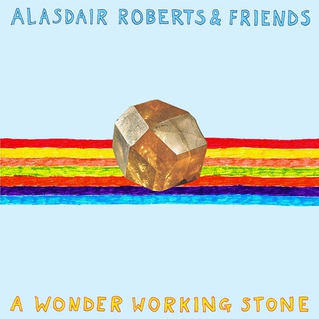Wonder Working Stone is Scottish singer-songwriter Alasdair Roberts’ seventh album under his own name, and the second to be appended with the ‘and friends’ tag, following 2010’s Too Long in this Condition. It also follows last year’s collaboration with Gaelic singer Mairi Morrison, Urstan, which, like Too Long in this Condition, was mostly a collection of traditional numbers. Roberts has long alternated between recording traditional songs and his own material, and it’s the latter path he’s followed here, showcasing Roberts the eclectic songwriter and virtuoso lyricist; though as ever, he remains deeply influenced by folk forms old and new, local and international, mixing them up with a rare delight.
At sixty-seven minutes, Wonder Working Stone is also notable for both its length and its girth- just ten songs, but none under five and a half minutes long, some stretching to nearly ten, and all fleshed out by the titular Friends to create a densely-layered, sprawling folk-rock hootenanny, rooted in the work of late-60s and early-70s colossi like Fairport Convention, Horslips and The Incredible String Band.
It’s the String Band that are most noticeably evoked in opening number ‘The Merry Wake’, meandering between ballad and jig and frequently split in twain by the bluesy electric guitar of Ben Reynolds (ex-Trembling Bells, now Two Wings). The musical crazy paving is both emphasised and held together by Roberts’ distinctive voice – unapologetically Scottish, keening and veering towards camp – and his insistent storytelling. As with many of the Incredible String Band’s songs, there’s a sense that each track has been deliberately dragged out beyond the point where it might reasonably have ended, a ragged, shaggy dog yarn or faerie riddle to try your patience and tie you up in linguistic and narrative knots. "All day long we’ll be drinking like masons" he informs us early on, and over the next six minutes or so the song weaves its way through a Joycean rout, full of surreal character vignettes: "the scribes and the clerics, like tribes of hysterics, will hectically dervish and turn widdershins."
‘The Year of the Burning’ takes as its subject the still-sobering injustices and barbarism of the eighteenth and nineteenth century Highland Clearances, in which many thousands of crofting families were burnt out of their homes or left to starve to death, largely so that the land could be turned over to more profitable sheep farming. Backed by crunching electric guitar and swirling violin, Roberts eulogises the peasant martyrs of "our sea-divided race." But there’s also a resonance with the current governments’ apparent war on the poor – as opposed to poverty- not least in the chorus "It’s whip crack on whip crack and whip crack," and the ambiguity of the imagery of burning buildings while the people cry "woe to the reign of the beast".
‘Fusion of Horizons’ is a sublime hybrid of soft rock ballad and fiddle-driven folk lament, the rounded tones of Ben Reynolds’ yearning guitar licks recalling Tim Bricheno’s playing with All About Eve, particularly alongside Olivia Chaney’s Anne Briggs via Julianne Regan backing vocals. Yet genuinely stirring dark depths lie in the song’s pondering on time and mortality, love and alchemy. ‘The Wheels of the World (the Conundrum)’ meanwhile returns to the stream-of-consciousness String Band style, weaving its way through several different styles and sections in its nine-and-a-half minute duration. Roberts’ wordplay here is as impressive and heavy in suggestive, near-impenetrable symbolism as Dylan in his amphetamine psychobabble pomp, with the Friar of Denial and the Abbot of Unreason consorting with the Maiden and the Crow, as the flag of the Erlking is unfurled and the wheels of the world spread death and destruction for two thousand years.
Roberts is endlessly quotable – "they sent a failed catastrophist with grasping fists and fiery eyes", from the spectral ballad ‘The End of Breeding’ is another favourite – yet A Wonder Working Stone isn’t always an easy listen. A long, endlessly twisting road through a densely wooded landscape, it can be daunting and exhausting for the casual listener. Highly allegorical, historical and Biblically literate, Alasdair Roberts can make Nick Cave seem like a picnic, PJ Harvey a pyjama party. Roberts also seems to set out to wilfully irk the purists; ‘Song Composed in December’ incorporates the Bluebell Polka, a brass band and a rap in Welsh by violinist Rafe Fitzpatrick, while Roberts sings "joy to those who use their songs as clues to find their clan, but woe to those who’d use them to enslave their fellow man- or their fellow woman…"
Happily however there is something near-instantly addictive about Roberts’ wide-eyed tenor, and the myriad complex hooks of this joyous, moving record, that pulls the listener back for repeated plays until the more knotty and impenetrable corners finally reveal themselves, all the more rewarding for their initial impenetrability. Each spin of the CD generates fresh pleasures, while warm familiarity with favoured moments comes surprisingly quickly. Whether it’s incest-themed clapping song ‘Brother Seed’ or the Celtic-Pagan Leonard Cohen of ‘Gave the Green Blessing’ or even the nursery folk and New Orleans jazz marrying ‘Scandal and Trance’, which demands "all days will end in joy, they’ll never end in evil." A Wonder Working Stone is the work of a songwriter at the top of his game; inspired by tradition but equally inspired to break from it, fired by collaboration and freed to follow his muse wherever it may soar, like the ptarmigans that spread their wings through several of these songs. Few can fly higher.


